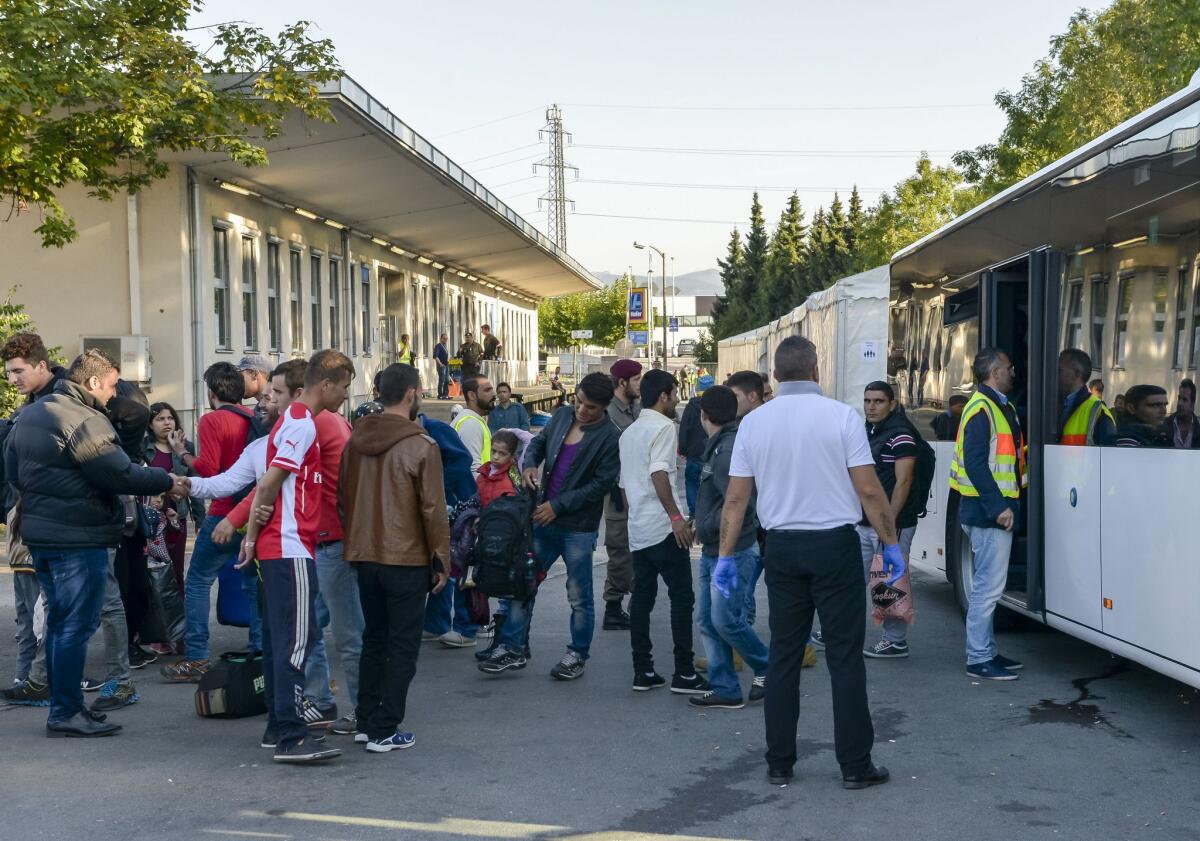Guest writer: Are Islamic State terrorists sneaking into the West?

New migrants arrive at a refugee camp located in the Austrian city of Salzburg, near the German border, on Oct. 2.
- Share via
It is rare that refugees are welcomed with open arms. Yet in parts of Europe, they are literally being greeted with applause. Though Europe’s response to the plight of the Middle East’s beleaguered masses may be heartwarming, it is also dangerously naive. Among the migrants are inevitably members of Islamic State and Al Qaeda. If Europe wants to help innocent victims, it should focus on extirpating the jihadist groups that are directly responsible for the exodus we are witnessing.
Not since World War II has Europe seen such a stark population shift. Germany is preparing to house a staggering 800,000 refugees from Syria and elsewhere this year, a decision that will surely alter the country’s very character. Other nations have also pledged refuge for significant numbers, and they will also inevitably face enormous integration challenges.
Meanwhile, Hungary and Slovakia have been vilified by many for rebelling against taking in thousands of refugees. Not only have they rejected European Union-imposed quotas, but both countries have made it clear that a mass Muslim migration would pose unacceptable demographic and cultural challenges. Their concerns are well founded, not only over integration but especially from a security perspective.
Lebanon’s education minister, Elias Bousaab, warned recently that two in every 100 Syrian migrants arriving in Europe are Islamic State fighters, sent to infiltrate a continent distracted by sympathy. If Bousaab’s conservative calculation proves accurate, it would mean that among the 10,000 Syrian refugees that Secretary of State John F. Kerry has pledged to allow into the United States in 2016, there could be 200 committed terrorists.
With Europe floundering for a unified approach to the refugee conundrum, there is little agreement on macro issues such as how to defend borders, let alone a coordinated way to verify the identity of those seeking asylum. And make no mistake, Islamic State and other enemies of the West are planning to exploit this chaos. In the last year, Islamic terrorists carried out major attacks in Paris and Copenhagen. And recently, three Americans on vacation thwarted an attack on a Paris-bound train.
Many Western leaders appear so self-satisfied with answering the call for refuge that they have fooled themselves into believing that their largesse provides a genuine solution. Actually, they’re creating a moral hazard, motivating millions more in the war-ravaged Middle East to try to make the perilous, often deadly journey to Europe.
The reality is that the only effective way to help those fleeing violence in Syria, Iraq and the wider region is to cut off the source of that violence — in the Middle East. A positive first step would be the creation of havens in Syria and elsewhere. Secure pockets of refuge near home, established and run by the international community, would win trust while providing a frontal position from which to defeat the scourge of Islamist terrorism.
Many in the West would prefer to open their arms to waves of refugees — terrorists among them — rather than take up arms to deal with the root of the problem. Of course, those who require refuge must be aided. But the West can best help them by flexing its considerable military muscle. Refusal to do so is likely to hand the likes of Islamic State a double victory, as it entrenches its positions in Syria and Iraq while also establishing a foothold in Europe.
Ari Harow, president of a consultancy for international political and government strategy, served as chief of staff to Israeli Prime Minister Benjamin Netanyahu until this year.
Follow the Opinion section on Twitter @latimesopinion and Facebook
More to Read
A cure for the common opinion
Get thought-provoking perspectives with our weekly newsletter.
You may occasionally receive promotional content from the Los Angeles Times.










